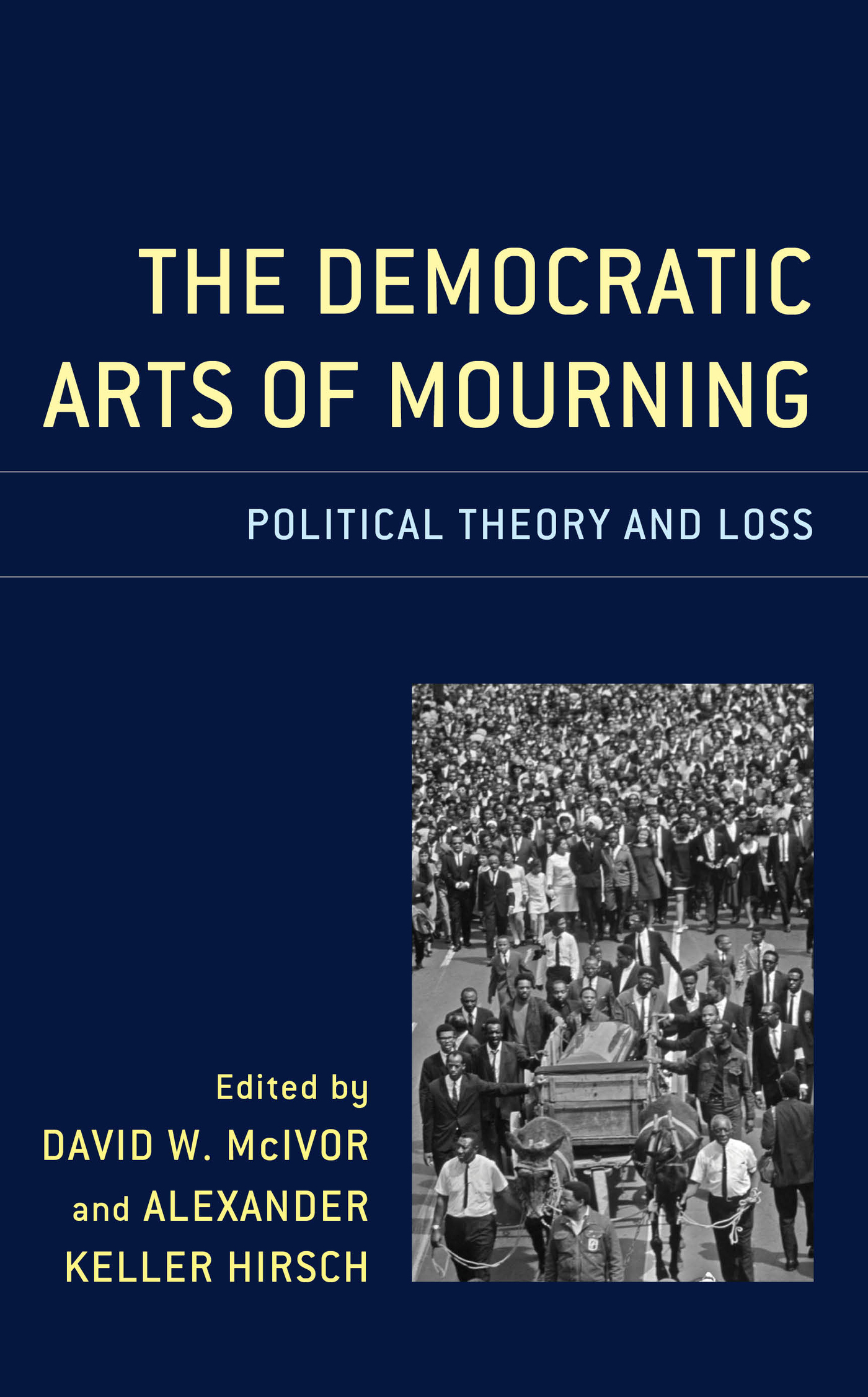The Democratic Arts of Mourning
The Democratic Arts of Mourning
Political Theory and Loss
Edited by
Alexander Keller Hirsch and
David W. McIvor
LEXINGTON BOOKS
Lanham Boulder New York London
Published by Lexington Books
An imprint of The Rowman & Littlefield Publishing Group, Inc.
4501 Forbes Boulevard, Suite 200, Lanham, Maryland 20706
www.rowman.com
6 Tinworth Street, London SE11 5AL
Copyright 2019 by The Rowman & Littlefield Publishing Group, Inc.
All rights reserved. No part of this book may be reproduced in any form or by any electronic or mechanical means, including information storage and retrieval systems, without written permission from the publisher, except by a reviewer who may quote passages in a review.
British Library Cataloguing in Publication Information Available
Library of Congress Cataloging-in-Publication Data
Names: Hirsch, Alexander Keller, editor. | McIvor, David Wallace, editor.
Title: The democratic arts of mourning : political theory and loss / edited by Alexander Keller Hirsch and David W. McIvor.
Description: Lanham, Maryland : Lexington Books, 2019. | Includes bibliographical references and index.
Identifiers: LCCN 2018050094 (print) | LCCN 2018061508 (ebook) | ISBN 9781498567251 (Electronic) | ISBN 9781498567244 (cloth : alk. paper) | ISBN 9781498567268 (pbk. : alk. paper)
Subjects: LCSH: Collective memory--Political aspects--United States. | Memorialization--Political aspects--United States. | Bereavement--Political aspects--United States.
Classification: LCC HM1027.U6 (ebook) | LCC HM1027.U6 D44 2019 (print) | DDC 909/.0973--dc23
LC record available at https://lccn.loc.gov/2018050094
 TM The paper used in this publication meets the minimum requirements of American National Standard for Information Sciences Permanence of Paper for Printed Library Materials, ANSI/NISO Z39.48-1992.
TM The paper used in this publication meets the minimum requirements of American National Standard for Information Sciences Permanence of Paper for Printed Library Materials, ANSI/NISO Z39.48-1992.
Printed in the United States of America
To J. Peter Euben, who, for a generation of students and colleagues, brought the connection between arguments and stories to life; and who, in the process, pushed us all out of complacency and comfort and toward a lively and cheerful practice in deep awareness of lifes fragility.
Introduction
David W. McIvor and Alexander Keller Hirsch
The Democratic Arts of Mourning
The Democratic Arts of Mourning
While philosophy may begin in wonder that things are the way they are... political theory begins with loss. Loss animates it as an enterprise and forms its problematic (Euben, 2003, 87). If, as J. Peter Euben has argued, the practice of political theory is animated by loss, then the very enterprise can be understood in terms of a work of mourningeven as an artifact of grief. Yet mourning is an ambivalent phenomenon. As much as it reveals or reflects a loss, mourning also presumes attachment. In mourning, the world appears impoverishedcold and empty in the famous phrasing of Freud (1917, 247)and yet this implies the warmth of a world that was once enchanted with meaning. Mourning links subjects to their past, but it can also sustain an impression of who they aspire to become in the future. Janus-faced, mourning therefore looks backward and forward, simultaneously. It seeks a new future in which a condition of possibility for renewal can be found, but mourning also testifies to the thrownness that occasions what was damaging in the past or what troubles us in the present.
This ambivalence can also be seen in another aspect of mournings dual character: it is, at once, personal and socialprivate and political. Although mourning is often envisioned as a solitary form of reckoning, political life is inevitably intertwined with experiences of attachment, loss, and grief. The most deeply personal losses are also embedded within the social worlds from which they are made. Even Job, whose story of suffering includes a deeply personal account of mourning, finds his plaint is ultimately the token of a longing to restore a sacred and symbolic order where subjects of pain truly deserve the suffering they undergo. Over the course of his story, Job regrets the loss of his family, articles of possession, and even his own bodily integrity, but his mourning reaches its fullest expression only when he articulates a desire to reinstate a regime of meaning where sign, rule, and norm govern the borders, positions, and boundaries that make life bearable (Hirsch 2016). Job yearns, in other words, for a world where structure, predictability, and law are returned after his own horizon of meaning has collapsed (Alford 2009). Thus, his mourning, ostensibly personal, in fact reveals an aspiration for a more just world.
The story of Job, then, shows the simultaneity of the personal and the social nature of loss and, hence, of mourning. From this, we can see how the subject of mourning entails not merely the idiosyncratic pathways of personal grief but also questions of collective attachments, symbols, and memories. Mourning entails rituals and narratives that are inherently civic and public and that reflect political choices and struggles over contested ideals and visions for collective life (Stout, 2010). A bank might close, for instance, in order to honor the legacy of Martin Luther King, Jr.; or it may close to dignify the memory of Robert E. Lee. This example also demonstrates how many detachmentsand many forms of mourningare linked with systemic injustices that vary historically yet often track along asymmetrical relations of power and privilege. Not all losses are made visible, let alone honored. As such, loss, grief, and mourningand the exposure to vulnerability to which they attestare distinctively political phenomena.
This volume reflects upon mournings ambivalence and brings its political nature into clearer focus, by examining the multiform ways in which mourning shows up in both contemporary politics and within contemporary political theory. Political theorists, in the first decades of the twenty-first century, have turned repeatedly toward themes of loss, grief, and mourning, reflecting a similar cultural turn toward these concerns (as Rebecca Comay puts it, we inhabit a trauma-besotted, memory-obsessed wound culture [2011, 129]). Political theorists have articulated the themes of loss and mourning with and against political theorys traditional concerns such as authority, power, freedom, agency, and justice (Butler, 1997, 2005, 2009; Honig, 2001 and 2013; Allen, 2004; Balbus, 2005; Barker, 2008; Hirsch 2015; Luxon, 2015; McIvor, 2016; Stow, 2017). Concurrently, mourning has become a significant theme in other academic disciplines including English, cultural studies, continental philosophy, sociology, and history (Eng and Kazanjian, 2002; Moglen, 2005; Derrida, 1994, 2003; Rose, 1996; Gilroy, 2005; Crimp, 1989; LaCapra, 2001). With this volume, we take stock of how political theorists have interpreted mourning as a political thematic, and offer further reflections on how the discipline might guide understanding of the politics of loss, grief, and mourning.
In this introduction, we first situate recent scholarship on mourning by tracing its debts to previous work on the politics of tragedy. We then describe some of the defining frameworks, claims, and distinctions made by contemporary theorists of mourning, before defending the particular frameworkthe democratic arts of mourningoffered here. The individual chapters that follow extend and deepen these conversations, demonstrating how mourning inflects contemporary political struggles, and how political theorys vocational commitments place it in both intimate proximity and critical distance to these struggles.
Next page
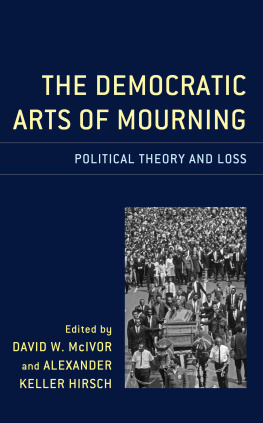

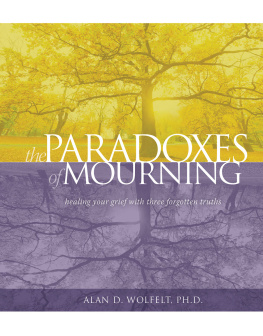


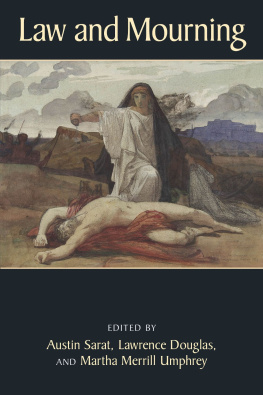
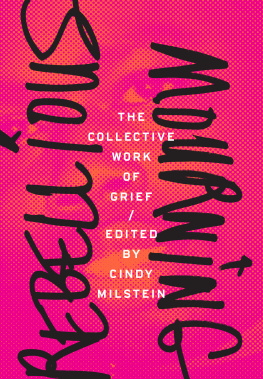
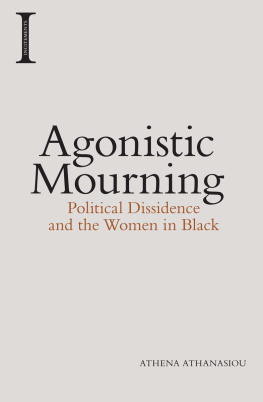
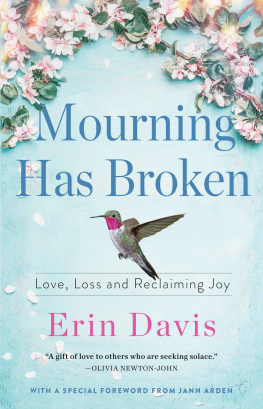
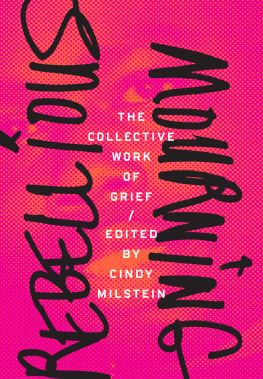

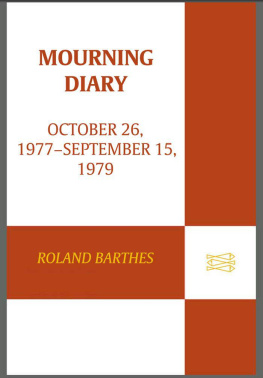
 TM The paper used in this publication meets the minimum requirements of American National Standard for Information Sciences Permanence of Paper for Printed Library Materials, ANSI/NISO Z39.48-1992.
TM The paper used in this publication meets the minimum requirements of American National Standard for Information Sciences Permanence of Paper for Printed Library Materials, ANSI/NISO Z39.48-1992.